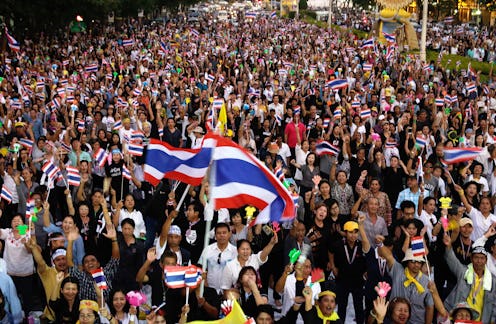News
Anti-Govt Protests Draw Thousands in Bangkok
In the most significant protests to rock Thailand in two years, almost a hundred thousand demonstrators gathered in Bangkok Sunday, calling for the removal of Prime Minister Yingluck Shinawatra and her Pheu Thai Party. Sunday's rally comes after weeks of smaller protests against a controversial bill granting amnesty to Thaksin Shinawatra, Yingluck's brother and the deposed former prime minister of Thailand, who has been widely accused of corruption.
According to local media, the demonstrations have already caused the two-day closure of many of the city's schools. The BMA permanent secretary Ninnart Chalitanon said Sunday that the closure was necessary in order ensure the safety of the students — demonstrators have threatened to break into 12 smaller groups and march the 12 main roads across Bangkok on Monday.
"The Thaksin regime has abused the power that it has borrowed from the people, and it's time that Thaksin should return that power back to the people," said the spokesman for the opposition.
The protestors are hoping that the size of the demonstration will urge the police, civil servants and the military to join their side. "If they can paralyze the country by a general nationwide strike, across the board — civil service, military, police and so on — then the country is ungovernable," said the director of the Institute of Security and International Studies at Chulalongkorn University. "They would then hope for an intervention from the military or the judiciary."
In a move reminiscent of Egypt's wave of summer protests, a simultaneous demonstration took place nearby, with roughly 40,000 pro-government "Red Shirts" rallying in support for Yingluck. It's expected that both protests will go on through the night, and the opposition protestors will most likely march on the Government House on Monday.
"This is a demonstration that is taking on historic proportions," said Al Jazeera's Bangkok reporter. "The people who have turned up are united in their push to kick the prime minister and the influence of her brother out of leadership, out of power. They want to dismantle those networks."
The unrest began when a controversial amnesty blanket bill — that would have applied to offences committed after the 2006 coup and during the violent 2010 crackdown on Thai protesters — was pushed through the lower house of Parliament last month. Many saw the bill as a way for Thaksin — who was convicted of criminal corruption in 2008 — to come back to Thailand from his (self-imposed) exile. Critics also accused the bill of allowing human rights abuses (like the killing of protesters) to go unpunished.
Thaksin was removed from his position as prime minister in 2006 by a military coup, and, two years later, the country's Constitutional Court dissolved the People's Power Party (PPP) — made up largely of Thaksin supporters — over electoral fraud. Another two years went by and then, in 2010, massive protests, led by the "Red Shits" erupted against Prime Minister Abhisit Vejjajiva and his Democrat Party government. The resulting military crackdown on the pro-government supporters left over 90 people dead.
The latest rounds of protests have already sparked fears in the international community, with several countries, including the U.K., France, Germany, Australia and Japan (but excluding the U.S.), issuing travel warnings for Thailand.
